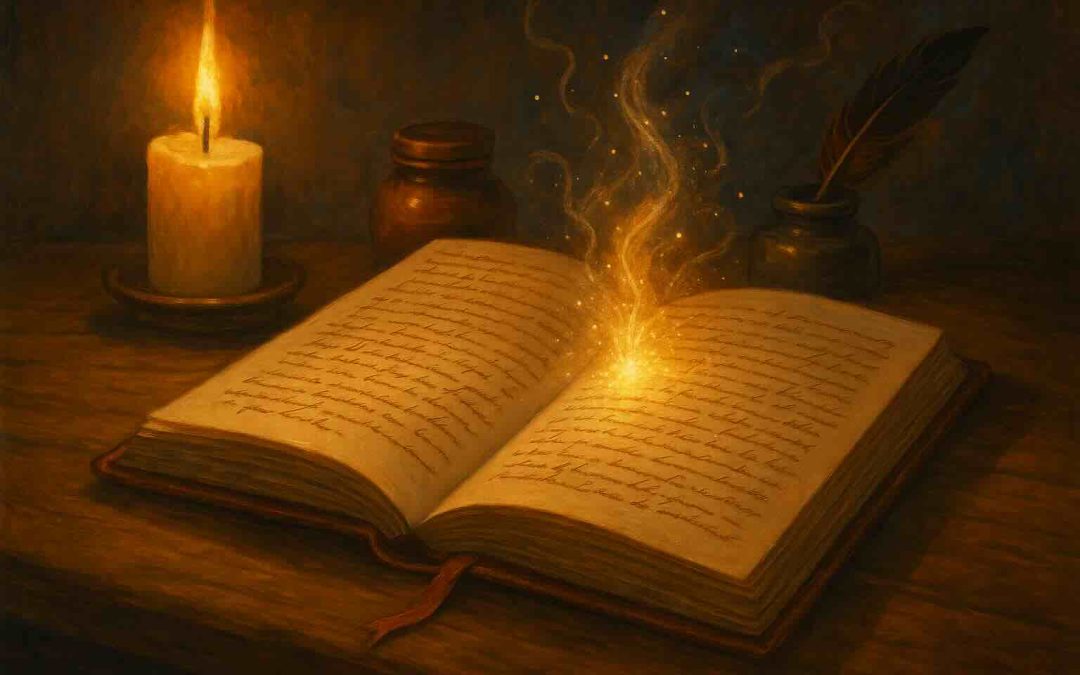There is something irresistible about stumbling across a diary inside a novel. It feels like peeking behind the curtain of a character’s soul, a secret glimpse into what they cannot say aloud. In fantasy and YA fiction, journals often hold more than confessions. They can carry spells, prophecies, and echoes of the past. These fictional notebooks remind us that keeping a journal is not just scribbling down daily events. It is an act of transformation.
One of the most famous examples is Tom Riddle’s diary in Harry Potter and the Chamber of Secrets. At first it seems like a harmless notebook that listens and responds. But writing in it draws Ginny Weasley into a dangerous connection with the past. This diary is a horcrux, holding a fragment of Voldemort’s soul. Dark as it is, the example illustrates something true about journaling. What you write has power. Your words are not neutral. They shape you and can sometimes trap you in old stories if you never challenge them.
On a gentler note, L. M. Montgomery’s Emily of New Moon shows the brighter side of keeping a diary. Emily pours her heart into her notebooks as she grows into her identity as a writer. Her journals are not magical objects, yet they still feel enchanted because of how much they help her transform. Anyone who journals regularly will recognize this. A notebook becomes both mirror and teacher, showing you where you are and nudging you toward where you want to go.
Cornelia Funke’s Inkheart trilogy goes even further. In that world, reading and writing have literal creative power, pulling characters out of books and into reality. Imagine what that means for a diary. Every line could give birth to a new world. And in Alice Hoffman’s Practical Magic, the Owens family’s magical records serve as spellbooks, memory keepers, and guides. These journals tie personal identity to ancestry, showing how writing links one life to a larger, ongoing story.
So why do these fictional diaries fascinate us? Because they are safe containers for the unspeakable. They hold secrets too heavy for conversation. They preserve shame, longing, and dreams. Sometimes they even lie. More often they tell the truth so directly that it stings. And that is exactly what our own journals can do. When you open a notebook and let your pen move, you are doing more than recording. You are conjuring the inner landscape of your life.
Think about rereading an old journal. The words you find there are like messages from a past self, sometimes shocking, sometimes comforting. It is almost like time travel. Diaries in fiction remind us that journaling is a kind of magic even when it looks ordinary. The stories we tell ourselves today become the paths we walk tomorrow.
If you want to bring some of that fantastical energy into your own practice, try writing as if your notebook is a portal. Instead of listing your day, imagine you are leaving a message for your future self. Ask what you want them to remember. This transforms journaling from record-keeping into prophecy. Another approach is to borrow the symbolic richness of dreams and stories. If your day felt overwhelming, describe it as a storm. If you encountered someone inspiring, sketch them as a mythical figure. The metaphors will turn your notebook into something alive.
You can even experiment with dialogue. In many fantasy novels the diary talks back, and you can mimic that by writing a question on one page and answering it on the next as if your journal has its own voice. This playful method often reveals insights that surprise you.
The deeper lesson is that journaling carries real weight. It shapes your sense of self. It grounds you in the present while giving you a thread to the past and a bridge to the future. Just like Emily Starr used her notebooks to grow into a writer, you can use yours to grow into the version of yourself you most want to become.
Fantastical diaries in fiction remind us that words matter. They can haunt, transform, or guide. And your own journal, though it may not glow with dark magic or whisper spells at midnight, holds just as much potential. Each entry you write is part of your mythology, your personal spellbook, your private epic. The only requirement is that you keep writing, trusting that the act itself is powerful. Journaling can change your life. Fictional diaries show us why.


Recent Comments